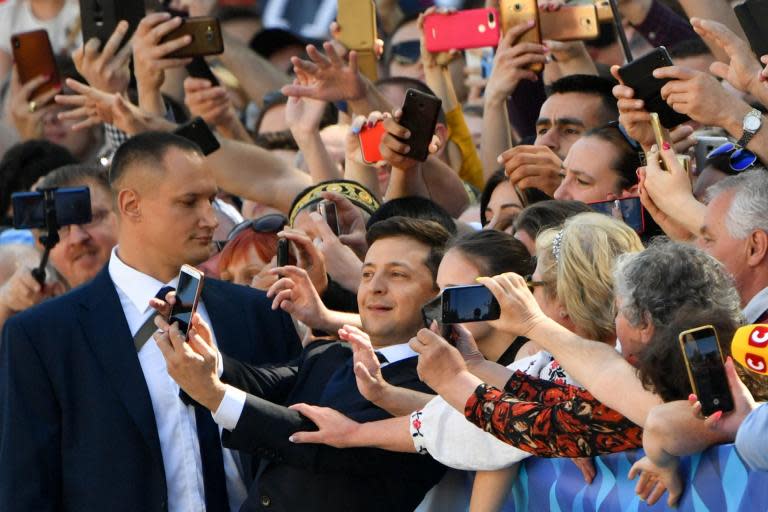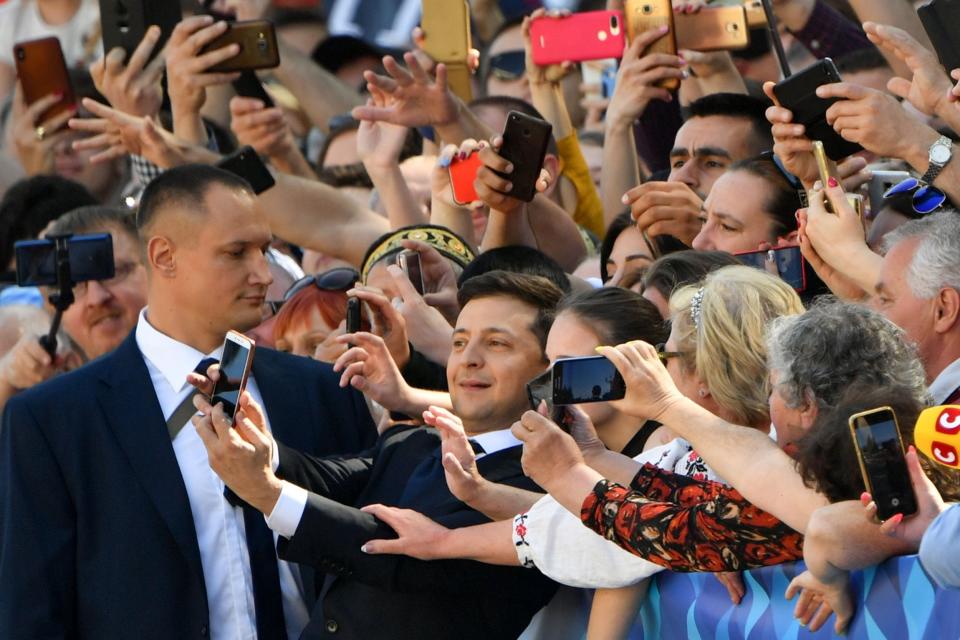Vladimir Zelensky: Ukraine's new president vows to dissolve parliament in first speech
Vladimir Zelensky was sworn in as Ukraine’s sixth president on Monday morning, with the one-time showman dramatically vowing to dissolve parliament and provoke snap parliamentary elections.
Mr Zelensky, a rookie politician, has long indicated he intended to disband the Supreme Rada, which was elected in 2014 and is largely hostile to him. But it was not immediately clear whether he had the legal authority to do so, and judicial arguments are likely to follow.
In a punchy 40-minute inauguration speech, Mr Zelensky hit on themes of anti-establishmentarianism and inclusivity.
The administration he was replacing had done nothing to make many Ukrainians feel Ukrainian, he said. His term would be different - and would work for all “regardless of who they voted for.” It was “a common victory.”
“Every one of us has taken the oath today,” he said. “Each of us carries a responsibility for the Ukraine that we want to leave to our children.”
Mr Zelensky said his "main priority" was to bring peace to eastern Ukraine, where a war with Russian-backed militias has been raging for the past five years. To the end of “stopping heroes dying,” he was ready to do “anything,” right up to sacrificing “popularity and post.”
At several points, Mr Zelensky obviously reached out to the Russian-speaking east of the country, who he said had been forgotten. He also promised citizenship to anyone “wishing to build the new Ukraine."
The rhetoric was demonstrably inclusive, and contrasted strongly with the ethnic nationalism espoused by his predecessor Petro Poroshenko, who was sat among several dozen foreign dignitaries in parliament.
The inclusive tone also provoked an obvious reaction from nationalistic elements in parliament. At one point, the populist MP Oleh Lyashko even entered into dialogue with him, ostensibly over his use of Russian.
“Enough, Mr Lyashko,” was President Zelensky’s response. “Enough dividing people. We are all Ukrainians. Ukraine is what is written on our passport.”
Ahead of the ceremony, Mr Zelensky’s aides promised a show that would ditch protocol. So it was to be. He arrived at parliament on foot, ditching the presidential motorcade. Following his speech, he left parliament for a victory lap, giving high-fives to the crowds he had invited to attend.
It was an obvious exhibition of his folksy manner and overwhelming popularity. It also seemed to be a declaration of intent to a parliament he had just taken on.
Ukraine’s parliamentary-presidential balance of power undoubtedly presents Mr Zelensky with his biggest challenge. The president has only limited powers of appointment, cannot fire ministers, and cannot pass legislation without parliamentary approval. He also has few obvious allies in parliament.
Mr Zelensky’s desire to dissolve the body and trigger fresh elections is understandable enough. But the logistics of doing so are more complicated than he suggested on Monday, and hostile parliamentarians are likely to put up a fight.
According to Ukrainian law, the president can dissolve parliament if and when there is no prospect of a working coalition. But a quirk of the law also allows a coalition 30 days to establish itself. The law also states that the president cannot break up the parliament in the six months prior to ordinary parliamentary elections that were scheduled for October.
This combination appeared to be behind to be the reasoning behind the 17 May announcement by People’s Front, a junior coalition partner, that it was leaving the coalition. Many assumed the manoeuvre had removed the window of opportunity for Mr Zelensky to call early elections.
On his first day in office, Ukraine’s new president boldly challenged those assumptions. With legal challenges inevitable. Mr Zelensky is banking that his popular backing will triumph over matters of procedure.
“Lawyers say there are grounds to dissolve, though that will be argued in court,” suggested the independent political expert Vladimir Fesenko in comments to The Independent.
“It may be irrelevant. In Ukraine, the logic of politics always dominates the logic of law."


